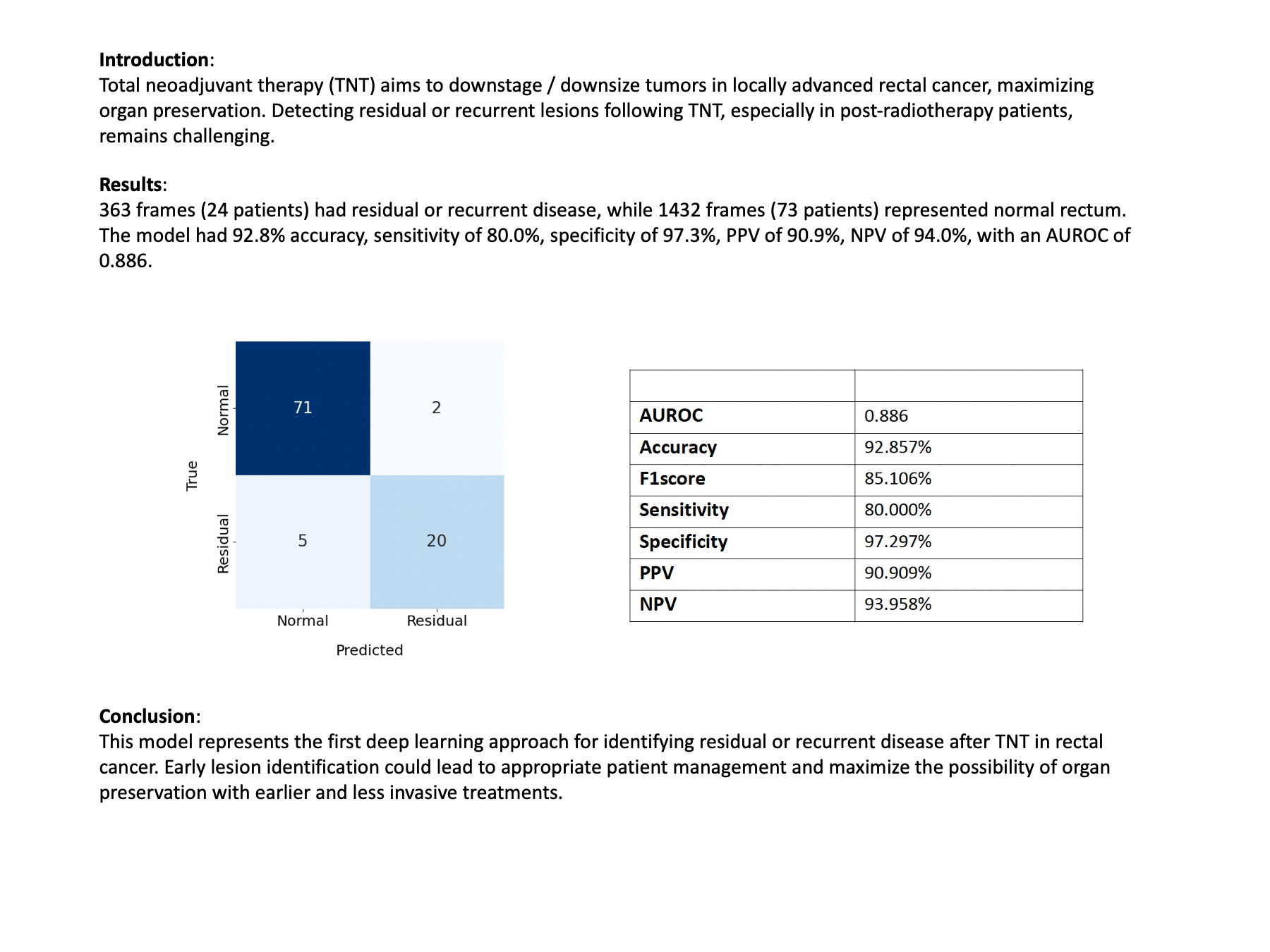Sunday Poster Session
Category: Colon
P0315 - Deep Learning and the Detection of Residual or Recurrent Disease in Rectal Cancer After Total Neoadjuvant Therapy
- MM
Miguel Martins, MD (he/him/his)
Centro Hospitalar Universitário São João
Porto, Porto, Portugal
Presenting Author(s)
1Centro Hospitalar Universitário São João, Porto, Porto, Portugal; 2Faculdade de Medicina da Universidade do Porto, Porto, Porto, Portugal; 3Hospital Universitario Puerta de Hierro-Majadahonda, Madrid, Madrid, Spain; 4Centro Hospitalar Universitário de São João, Porto, Porto, Portugal; 5Royal Liverppol University Hospital, Liverpool, England, United Kingdom; 6Royal Liverpool University Hospital, Liverpool, England, United Kingdom
Introduction:
Total neoadjuvant therapy (TNT) is a mainstay for locally advanced rectal cancer, in order to downstage / downsize tumors, with the aim of maximizing organ preservation. Restaging is commonly performed after TNT with magnetic resonance imaging and endoscopy. In this context, detecting residual or recurrent (in patients with complete response) lesions is particularly important. Residual or recurrent lesions could be challenging to identify in patients previously submitted to radiotherapy due to the presence of a friable mucosa with neovascularization. In this context, our group tried to develop the first deep learning model for identification of residual or recurrent lesions during proctosigmoidoscopy in patients with rectal cancer submitted to TNT.
Methods:
A convolutional neural network (Wide ResNet-101-2) was developed using a dataset of annotated frames from proctosigmoidoscopy exam from a tertiary reference center (Royal Liverpool University Hospital). 1795 frames from 97 patients were used for model development. Residual / recurrent disease implied histological evidence either through biopsy or surgical specimen analysis. The dataset was divided in a training and testing dataset with a 90/10% ratio and a patient split design. Models’ performance was evaluated using sensitivity, specificity, accuracy, positive (PPV) and negative predictive value (NPV) and area under the receiver operating characteristic (AUROC) curve.
Results:
363 frames (24 patients) had residual or recurrent disease, while 1432 frames (73 patients) represented normal rectum. The model had 92.8% accuracy, sensitivity of 80.0%, specificity of 97.3%, PPV of 90.9%, NPV of 94.0%, with an AUROC of 0.886.
Discussion:
To our knowledge, this is the first model for detection of residual or recurrent disease after TNT in rectal cancer patients. Early lesion identification could lead to appropriate patient management and maximize the possibility of organ preservation with earlier and less invasive treatments. 
Figure: Main findings
Disclosures:
Miguel Mascarenhas Saraiva indicated no relevant financial relationships.
Miguel Martins indicated no relevant financial relationships.
André Martins dos Santos indicated no relevant financial relationships.
António Miguel Martins Pinto da Costa indicated no relevant financial relationships.
Maria João Almeida indicated no relevant financial relationships.
Joana Mota indicated no relevant financial relationships.
João Afonso indicated no relevant financial relationships.
Tiago Ribeiro indicated no relevant financial relationships.
Abdullah Bunaiyan indicated no relevant financial relationships.
Pedro Cardoso indicated no relevant financial relationships.
Francisco Mendes indicated no relevant financial relationships.
Guilherme Macedo indicated no relevant financial relationships.
Ahsan Javed indicated no relevant financial relationships.
Miguel Mascarenhas Saraiva, MD, PhD1, Miguel Martins, MD1, André Martins dos Santos, MD2, António Miguel M P D. Martins Pinto da Costa, MD3, Maria João Almeida, MD4, Joana Mota, MD1, João Afonso, MD1, Tiago Ribeiro, MD1, Abdullah Bunaiyan, MD5, Pedro Cardoso, MD1, Francisco Mendes, MD1, Guilherme Macedo, MD, PhD1, Ahsan Javed, MD, PhD6. P0315 - Deep Learning and the Detection of Residual or Recurrent Disease in Rectal Cancer After Total Neoadjuvant Therapy, ACG 2025 Annual Scientific Meeting Abstracts. Phoenix, AZ: American College of Gastroenterology.
